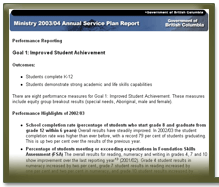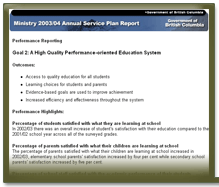 |
|
|
2003/04 Annual Service Plan Report
Ministry of Education
Performance Reporting
Overview of Ministry Goals
The performance results presented in this report cover the goals, objectives and strategies identified in the Ministry of Education Service Plan 2003/04 – 2005/06.
- Improved student achievement.
- A high quality performance-oriented education system.
Each year, the ministry collects, reviews and distributes a variety of data for accountability purposes and to support performance management. The collection of student enrolment data supports a student-based funding formula. The assignment of a unique identifier to each student, the Personal Education Number (PEN), is used to monitor student achievement and generate statistics about student movements and transitions between grades and schools. Performance data, including breakout results that include students with special needs, Aboriginal students, ESL students, Gifted students, French Immersion students, male and female students are also collected and monitored.
The ministry strives to improve all areas of student performance. At the ministry level, overall results are presented as provincial rates. When there is improvement at the district level, it is reflected in the provincial rate.
The principal goals of the Ministry of Education are achieved through the performance of partners, specifically the school boards of British Columbia. To help ensure that the goals of the ministry are met, and in an effort to contribute to an effective system of governance for the school districts of BC, the ministry has implemented 'Accountability Contracts'12 in partnership with school boards. Formalized on July 1, 2002, the Accountability Contracts reflect the local school boards' commitment to improving student achievement.
Goal 1: Improved Student Achievement — Summary
Core Business Areas:
- Public Schools
- Independent Schools
- Program Management
Objectives:
- To improve student performance in areas of intellectual development
- To improve student achievement in career development
- To improve student achievement in areas of human and social development
- To achieve high academic results when compared to other jurisdictions
- To reduce inequalities among students in terms of their ability to meet the goals of education
Key Strategies:
- Establish standards
- Collect information
- Monitor performance
- Identify and report areas of low performance
- Undertake initiatives intended to improve performance
- Participate in national and international assessments
Performance Measures:
- Completion rates
- Completion rate by breakout group
- Foundation Skills Assessment Results
- Grade 8-9 Transition Rate
- Percentage of students with 'C' Grade or better
- Percentage of students making transition to work and/or post-secondary education
- Percentage of students in agreement with statements reflective of social responsibility
- BC's standing on national and international assessments
Risks
- Increased autonomy at the local level necessitates accountability controls at the provincial level to ensure that the goals and objectives of ministry and its service partners are correctly aligned
Goal 2: A High Quality Performance-oriented Education System — Summary
Core Business Areas:
- Public Schools
- Independent Schools
- Program Management
- Corporate Services
- Debt Services and Amortization
Objectives:
- To establish the infrastructure needed to focus the education system on student achievement
- To improve and maintain student, parent and teacher support for the K-12 education system
Key Strategies:
- Focus the role of schools boards on student achievement through accountability contracts and support these contracts with district reviews
- Provide performance data to the school boards to assist them in improving student achievement
- Provide a less directive funding system
- Set standards for maintenance of school facilities
- Eliminate or rewrite policy or legislation to reflect increased school board autonomy
- Administer satisfaction surveys to monitor levels of teacher, student and parental satisfaction
- Enhance data collection to enable performance reporting
- Monitor student level performance by school district
- Measure effectiveness of information technology resources to meet performance goals
- Communicate business plans and strategies within the ministry
- Encourage school boards to create strategies to improve teacher, parent and student satisfaction
- Deputy Minister and superintendents to identify areas for improvement annually in each school district
Performance Measures:
- Percentage of students, teachers and staff satisfied with their schools
- Proportion of buildings with life expectancy under 10 years
- Number of page views on Ministry of Education's website

Report On Results
 |
 |
Goal 1: Improved Student Achievement |
 |
 |
 |
 |
 |
 |
 |
 |
 |
Goal 2: A High Quality Performance-oriented Education System |
 |
 |
 |
 |
 |
 |
 |
Deregulation
In support of the province-wide New Era commitment to reduce the regulatory burden in British Columbia, the Ministry of Education established a three-year deregulation plan with the overall reduction target of 23 per cent in the number of regulatory requirements. The target for 2002/03 of 12 per cent was exceeded, with a reduction of 13.9 per cent.
The target for 2003/04 of a reduction of 8 per cent was also exceeded, with a reduction of 11.8 per cent. As of March 31, 2004 the Ministry of Education had achieved its three-year reduction target of 23 per cent, with a total reduction of 25.7 per cent. The ministry is committed to ensuring the three-year deregulation target is maintained through 2005/06.
The ministry supports the move to performance-based regulation, where appropriate. This approach is consistent with the ministry's strategic direction to provide school boards with the autonomy and flexibility to meet the needs of students, within a framework that emphasizes student achievement and holds the education system accountable for results.
| |
2002/03 |
2003/04 |
2004/05 |
| Target |
12% |
8% |
3% |
| Achieved |
13.9% |
11.8% |
— |
Changes from Previous Service Plans
In an effort to focus on the few, critical aspects of performance, the Ministry of Education continues to narrow and refine its performance measures. While all performance measures reported on in the 2003/04-2005/06 service plan are important, focusing on the critical performance measures allows the ministry to better define the system's success in achieving government's goals.
Discontinued performance measures
| Performance measures |
Rationale |
- Grade 12 survey participation rate
- Turn around time for student enrolment data, Foundation Skills Assessment results, and satisfaction survey results
- Percentage of schools whose students report high or very high satisfaction in areas of human and social development
- Percentage of parents who report they can play a meaningful role in their child's education
- Percentage of parents satisfied with the goals for school improvement set by school planning councils
- Percentage of parents and students reporting satisfaction with the educational choices available to them
|
Performance measures that are drawn from the annual satisfaction survey may change over time, as the questions contained in the survey itself change. Detailed information on the satisfaction survey including results, questions and participation rates is available online at: www.bced.gov.bc.ca/sat_survey/ |
| Performance measures |
Rationale |
- Percentage of principals satisfied with school bandwidth
- Number of T1 or equivalent connections to schools
|
Performance measures regarding school bandwidth are discussed in the Updated on Key Projects section of this report. |
| Performance measure |
Rationale |
| Percentage of Directors with performance management contracts |
100% of Directors now have performance management contracts in place. |
| Performance measure |
Rationale |
| Number of Aboriginal enhancement agreements signed |
A complete listing of school districts with enhancement agreements is available at: www.bced.gov.bc.ca/abed/
agreements/agreements.htm |
| Performance measure |
Rationale |
| - Provincially approved curricula will undergo a review for relevance and currency within eight years of the implementation date |
Curriculum is being reviewed and refined so that there are clear outcomes and achievement indicators in each curriculum area. As this review is completed (2003 – 2006), the curriculum shifts will be updated on the Ministry website. |
| Performance measure |
Rationale |
| - Develop goals and measures of success for educators in public schools |
This measure is reflected in key indicators student achievement, including FSA results and completion rates |
| Performance measure |
Rationale |
| - Development of a survey to gather information on how much time principals and vice-principals spend in classrooms |
This information is collected through the British Columbia Principals and Vice Principals Association to support their work in teacher support. |
Performance Measures to be reported on in forthcoming Service Plan Reports
| Performance measures |
|
- Percentage of superintendents and secretary treasures who report that the funding system in understandable, transparent and comprehensive.
- Percentage of stakeholder satisfaction with deregulation
|
Data on these performance measures will be collected in the fall of 2004 |
| Performance measure |
|
| - Percentage of school districts that have demonstrated and reported improvement on their accountability contract goals |
2002/03 was the first year that school districts were required to have accountability contracts in place. As such, there is not yet sufficient data to properly establish trends. |
|
|



